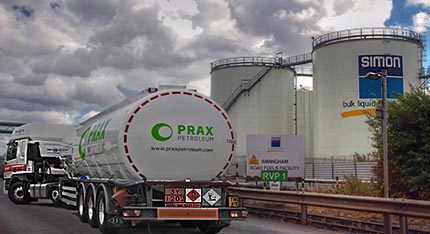Greater complexity
Stock control work has become increasingly complicated with some niche areas – such as AvGas for light aircraft and military requirements – requiring much additional documentation and HMRC administration. The capability to store hydrocarbon oil and biofuel products under excise duty suspension arrangements is a key aspect of the Simon Storage business. The correct operation and control of stocks held in the duty suspended warehousing facilities is fundamental to this capability.
Recent years have seen significant changes; which have led to greater complexity in terms of Simon’s stock accounting and HMRC compliance functions. The changes have been driven by a number of factors including developments in fuel technology and environmental legislation, more complex fuel blending operations, economic volatility and a revised regulatory methodology resulting from reductions in HMRC resources. In combination these factors have had a substantial impact.
Simon Storage has responded to this challenge by establishing a dedicated in-house Customs and Stock Management Services (CASMS) team to focus on compliance. The team assists terminals with customer queries related to stock reporting and excise duty issues where required, providing expertise to facilitate full compliance with relevant stock management and HMRC approvals.
Opening up new storage horizons
Greenergy operates a biodiesel plant at Immingham West. Indeed, the growth of the specialised fuels market, and biofuels in particular, has provided new work along with the recent introduction of a ‘first fill’ fuel contract for prestige cars on behalf of another customer who is new to the terminal.
Now, as oil majors withdraw from North Sea oil fields, selling interests to smaller companies with novel technologies to get the last buck out of the field, a decommissioning and waste management industry is emerging.
“We were part of the process when North Sea oil extraction took off, now as its fields decline and close there’s a new storage need emerging,” said Keith. “We now have a permit from the Environment Agency to handle a broad range of aqueous waste and to transfer this to UK disposal sites. Some waste will be potentially presented with Naturally Occurring Radioactive Material so we’re now looking to gain appropriate permitting to allow us to handle these specialist streams. Ideally, we’d like to receive, store and treat using our own onsite effluent treatment plants.
“Still a decade off, I believe there’s a whole new industry to be borne out of fracking, with energy storage and responsible receipt, disposal of waste water and chemicals derived from these processes.
“Also in the Humber region, carbon capture and storage has been under discussion. We await results from Statoil’s pilot plant in Norway to see how these economics develop.”
Providing infrastructure support
On a dock site first developed over 100 years ago by the Great Central Railway Company with interesting connections to the Pilgrim Fathers and the Titanic, Simon continues to play its part in supporting our energy infrastructure, bankrolling asset conversion work against a commercial agreement with a potential customer.
“Storage and distribution of oil products is tough at the moment for our customers. In the halcyon days, we’d often wonder how we were going to accommodate enquiries for product. In recent times the credit squeeze has had an impact and backwardation means product can be worth less just a day after it’s purchased. As a result, more product is now mortgaged, with a bank holding legal interest, and stocks are managed to maintain as small an inventory as practicable, but balancing this against economic parcel sizes for shipment.”
Safety is paramount to Simon, each of its UK terminals having won a RoSPA award every year for nearly 20 consecutive years. This year the Immingham terminals each merited a special order of distinction for excellence in health and safety.
Living with the hydrocarbon chain
“The hydrocarbon chain remains an intrinsic part of the complicated building blocks which make up our 21st century life. It’s not just about buying oil products such as the fuel for your car; it’s about all the other essential benefits that oil produces for our present way of life.”
___________________________________________
Company information
Simon Storage, part of Inter Pipeline Europe Ltd, is a wholly owned subsidiary of Inter Pipeline Ltd., which operates energy infrastructure assets in western Canada, the UK, Germany, Ireland and Denmark.
The 4th largest in European capacity, Inter Pipeline’s European operation has 8 terminals in the UK, Ireland and Germany with a combined bulk liquid/gas storage capacity of 1.28 million m3, and 4 terminals in Denmark with 1.8 million m3. Across Simon’s storage network, 250 different products and blends are handled, including the full range of petroleum and petrochemical products, renewable fuels, chemical products and vegetable oils.
News
Simon – investing in our infrastructure
“From an economic perspective, Immingham is a very important hub in the UK’s infrastructure,” says Keith L Jackson, director of Immingham Storage Company, part of Simon Storage.
In addition to being home to Simon’s Immingham East and West terminals, the Humber Estuary has two refineries which together supply over 20% of the UK’s refined product – Total’s Lindsey and Phillips 66 Humber, the latter specialising in petroleum coke for export.
The Associated British Ports’ (ABP) Immingham Dock & Grimsby Ports receive between 55-60m tonnes of cargo a year, of which approximately 22m tonnes are oil products. Immingham Storage handles large quantities of oil products, including many niche and specialised refined products. Fuels represent around 40% of the Simon business; a licence to store crude oil was surrendered in 2007 but recent enquiries may change this position.
The two Immingham terminals operate via two deep water jetties with 6 berths owned by ABP; each can accommodate ships up to 50,000 DWT. Approximately 50 ships a month call at the West terminal to deliver or collect products, with 25 ships a month using the East terminal.
Together, Immingham East and West comprise the UK’s largest terminal of its type, handling up to 1.5m tonnes of product a year with over 600,000m3 of storage.
Growth in the East terminal, managed by Andrew Rhodes, has largely been both by organic development and by acquisition; an ex liquid sulphur terminal, the most recent purchase, was acquired three years ago. The terminal, with up to 14” import/export lines and easy-to-convert tanks, offers significant flexibility as recently witnessed by the conversion of some capacity to gasoline standard post Buncefield with Safety Instrumented Systems. The facility can offer food grade product storage, as well as pressurised chemical gases. Installed 18 months ago, the East has a holding tank for effluent which then feeds into a bioreactor tank for treatment before being discharged into the Humber under an environmental permit. The West terminal, which has a similar system in place, can additionally recover up to 250 tonnes of water per day for reuse in other applications.
Fuel Oil News editor, Jane Hughes was invited to take a tour of Immingham Storage to see the operations first hand.
Managing a capital intensive business
Established in 1929, creosote was the first product stored by Immingham Storage at the West terminal before being exported to the USA.
Like much of the UK’s terminal infrastructure, both terminals were largely developed in the mid-1950s. Texaco and Esso (sea fed from Fawley) had terminals in the area – both acquired by Simon as part of the development of what was to become the East terminal.
It takes a 100-strong team, working 5 shifts daily round the clock 365 days a year to receive and deliver products, and to take care of routine maintenance, breakdown, out of service inspections and project work such as changing product in a tank or updating systems/infrastructure. Some projects, like a current one to replace electrical infrastructure, will end up costing over one million pounds and take up to four years to complete. Seeking to maintain a good level of control, project management work is handled internally, with Simon developing its own conceptual and then detailed design, tendering, selection of contactors and management of project delivery through to project commissioning and handover to the terminal.
Over £2m is spent on capital maintenance projects annually, primarily to tackle ageing plant issues. In addition to the ‘routine’ tank inspections – there are 137 tanks in the West and 104 in the East. Keith told Fuel Oil News: “The big push is now on the site’s key arteries, its pipework.” Visual detailed checks, radiography and NDT techniques are among the methods used to identify corrosion, poor quality welding and other defect issues. At the West 95% of tanks are the original build although many have had major refurbishment work performed, including new floors and bases installed, as a result of the ongoing inspection and refurbishment programme. The cost to rebuild three tanks recently was £5m. Some ten tanks have been totally replaced on the West terminal alone as a result of this inspection programme.
“This is the proverbial Forth Bridge – we’re constantly seeking to identify potential problems and then fixing them – making it a very capital intensive business,” explained Keith. “We audit ourselves and our contractors – we step in early to correct so that any identified poor practice, be it safety related or quality of delivery, is not allowed to escalate. This is a human intensive process and virtually a permanent construction site with up to 100 contactors on site at any one time.
“For example, we’re currently studying the site fire system – which was built some 25 years ago. Life’s moved on so we’re assessing ours against current best practice and expect to spend a not insignificant sum on making the system fit for the next 25 years of its life.”
With energy costs to run the sites a big consideration, a biomass boiler, rather than an oil one, is being considered for steam production. It is hoped that a mix of energy sources will give some protection against future energy price fluctuations.
Coping with the legacy of Buncefield
“The industry’s head went down in a big way post Buncefield,” said Keith. “Working with regulators, the industry took a long, hard look at how it conducted itself in order to learn from the incident. Simon, in common with the rest of the sector, has spent much time and money in improving technical competence as well as its infrastructure; we now have a much better structure in place to effectively control Major Accident Hazards as well as better and more demonstrable safety leadership.
“Born out of Buncefield, the implementation of the containment policy has made a huge change around the site. New bund walls have had to be constructed extending up to three metres below ground. Boreholes enable regular samples to be taken to monitor groundwater quality and movement. We’ve spent over £2m on work so far at Immingham that is necessary to give us a licence to stay in business.
Working in a changing storage world
“The storage industry has seen a lot of change over the last few years; as oil and chemical majors have retreated, we’re working more with oil and chemical traders and wholesalers. The latter are part of a logistics chain rather than original manufacturers, meaning that customer technical expertise has dwindled and the level of contact and information quality has declined.”
Simon does draw on in-house expertise – its safety team is headed by a chemistry PhD, and there are specialists in environment, mechanical, electrical/control engineering and human behaviour – and, being part of a larger group, there is usually someone with the right knowledge to help handle any new specialised product.
The retail market has become increasingly difficult with an overall decline in consumption, and dieselisation of the car fleet. The UK is now a net importer of diesel and adding ethanol to gasoline, which is in oversupply, for RTFO purposes has exacerbated its market problems further. International product imbalances have removed traditional dumping grounds for gasoline from Europe. “It’s a buy one, get one free market, where gasoline is taken in return for a deal on diesel from UK refiners,” said Keith. “We are pleased that from a standing start, our customer, Prax Petroleum, has been successful in growing its commercial business here at Immingham against this background of a difficult market.
“We’ve been reasonably successful in attracting new chemical business,” said Keith. “It’s a market dear to our hearts and one in which we have much technical expertise. REACH has had the effect of driving out hazardous chemicals from the market, particularly toxics. Regulatory pressure in Europe means it’s increasingly difficult to operate here; much manufacturing has gone to the Far East where there’s little equivalent environmental legislation. New world scale plants offer economies of scale and levels of manufacturing integration and sophistication that are simply not achievable in European plants that were often constructed in the post war period. Coupled with structural changes, manufacturing businesses closing, and supply contracts ending, it’s a sad reflection of a chemical manufacturing sector in decline.
“In February 2014 COMAH, after amendment under SEVESO III, will classify fuel oil as Dangerous for the Environment. For a market that’s not great right now and has not been historically strong, this additional legislation will be another challenge. Traditionally a lower end product in the market, this new classification has the potential to introduce significant new costs to the storage of this fuel which is already seeing reduced volumes.
“Marine fuel also has issues. As ship operators look to move away from heavy fuel oil as a result of SECA (Sulphur Emissions Control Areas), we face the biggest change since shipping moved from coal to oil. Government sponsored Navy oiling stations around the world provided physical impetus for the change from coal to oil burning ships of the line and the merchant fleet at the turn of the 19th century; now we face a new transition. LNG is mooted as the new marine fuel of choice but its storage, shipping and distribution are extremely difficult and hence expensive; there are no current standards for bunkering and little infrastructure on the ground and no national need to drive through change. LNG storage has been built in Rotterdam (GATE) and in the UK at the Isle of Grain, amongst other UK/European locations. However, these were not designed with ship bunkering specifically in mind or indeed any break bulk activity for onward distribution, although clearly these are under consideration now. Construction of smaller scale distribution and bunkering sites at other main UK ports is a possibility but we are a small island where typically no one wants LNG storage in their back yard. However Simon will look at opportunities in this field and, if there’s half a chance of making it work, we’ll explore the relevant avenues to develop concepts on a commercial basis.”




